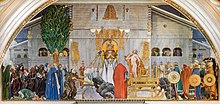blót
Hello, you have come here looking for the meaning of the word blót. In DICTIOUS you will not only get to know all the dictionary meanings for the word blót, but we will also tell you about its etymology, its characteristics and you will know how to say blót in singular and plural. Everything you need to know about the word blót you have here. The definition of the word blót will help you to be more precise and correct when speaking or writing your texts. Knowing the definition ofblót, as well as those of other words, enriches your vocabulary and provides you with more and better linguistic resources.

An artist's vision of a blót (Midvinterblot by Carl Larsson)
See also: Appendix:Variations of "blot"
English

Etymology
Learned borrowing from Old Norse blót.
Pronunciation
Noun
blót (plural blóts)
- A Norse (and modern Heathen) ceremonial offering.
- 2001, John Lindow, Handbook of Norse Mythology, ABC-CLIO, page 35:
- These show us the importance of verbal activity at a blót, specifically verbal activity aimed at producing a result, presumably by means of intervention by the deities.
- 2005, Galina Krasskova, Exploring the Northern Tradition: A Guide to the Gods, Lore, Rites, and Celebrations from the Norse, German, and Anglo-Saxon Traditions, Career Press, page 151:
- In the past, before Christianity spread across Europe, the average blót would generally have involved some sort of animal sacrifice.
- 2006, Anders Andrén, Kristina Jennbert, Catharina Raudvere, Old Norse Religion in Long-term Perspectives: Origins, Changes, and Interactions : an International Conference in Lund, Sweden, June 3-7, 2004, Nordic Academic Press, page 75:
- He soon comes back to land, makes a largely undescribed blót sacrifice to Óðinn, and receives confirmation of his god's approval in the flight of two cawing ravens.
- 2009, The Ásatrú Edda: Sacred Lore of the North, The Norroena Society, page 5
- Do you know how to blót? / Do you know how to slaughter?
Anagrams
Old Norse
Etymology
From Proto-Germanic *blōtą (“offering, sacrifice”). Cognate with Old English blōt and the first part of Old High German bluozhūs (“heathen temple”).
Ultimately from Proto-Indo-European *bʰlād- (“to offer, sacrifice”).
Pronunciation
Noun
blót n (genitive blóts, plural blót)
- (Germanic paganism, especially in the plural) offering
- Kristni saga 11, in 1858, J. Sigurðsson, G. Vigfússon, Biskupa sögur, Volume I. Copenhagen, page 20:
- fyri norðan, þar voru áðr blót ok hörgar.
- to the north, there were up to now offerings and personal shrines.
- Kristni saga 11, in 1858, J. Sigurðsson, G. Vigfússon, Biskupa sögur, Volume I. Copenhagen, page 20:
- (Germanic paganism) sharing of food of an offering in a ceremony, feast
- Separate Saga of St. Olaf 96, in 1853, P. A. Munch, C. R. Unger, Saga Olafs konungs ens Helga. Copenhagen, page 104:
- En þat er siðr þeirra at hafa blot a havst oc fagna þa vetri,
- But it is a custom for them to have a feast at fall and celebrate the winter,
- Separate Saga of St. Olaf 96, in 1853, P. A. Munch, C. R. Unger, Saga Olafs konungs ens Helga. Copenhagen, page 104:
- (Germanic paganism) offering site, a place to make offerings
- Borgarthings-Christenret 24, in 1846, E. Hertzberg, Norges gamle love indtil 1387, Volume I. Christiania, page 383:
- Engi maðr ſkal hafa i huſi ſinu ſtaf eða ſtalla, vit eða blot,
- No man shall have in his house a staff or an altar, a charm or an offering site,
- Borgarthings-Christenret 24, in 1846, E. Hertzberg, Norges gamle love indtil 1387, Volume I. Christiania, page 383:
- cursing, an offering for the purpose of seeking vengeance against an other
- Sturlunga saga, chapter IV, 50, in 1817, Þ. E. Rangel, Sturlunga-Saga edr Íslendínga-Saga hin mikla, Volume I. Copenhagen, page 101:
- snéri hann til dura ok sá fimm menn úti, heyrdi hann þá blot,
- he turned to the doors and saw there five men, and then heard cursing,
- Sturlunga saga, chapter IV, 50, in 1817, Þ. E. Rangel, Sturlunga-Saga edr Íslendínga-Saga hin mikla, Volume I. Copenhagen, page 101:
Declension
Declension of blót (strong a-stem)
Derived terms
- blótan (“sacrificing”)
- blótauðigr (“rich in sacrifice”)
- blótbað (“sacrificial bath”)
- blótbiskup (“heathen priest”)
- blótbolli (“sacrificial bowl”)
- blótdrykkja (“sacrificial feast”)
- blótdómr (“idolatry”)
- blótfé (“sacred goods”)
- blótgoði (“heathen priest”)
- blótgrǫf (“sacrificial den”)
- blótguð (“heathen god”)
- blótgyðja (“heathen priestess”)
- blóthaugr (“sacrificial mound”)
- blóthof (“heathen temple”)
- blóthús (“heathen house of worship”)
- blóthǫrgr (“sacrificial altar”)
- blótkalfr (“the golden calf”)
- blótkelda (“sacrificial fen”)
- blótklæði (“sacrificial garments”)
- blótkona (“idolatress”)
- blótlundr (“sacred grove”)
- blótmatr (“food eaten at sacrificial feast”)
- blótmaðr (“idolater”)
- blótnaut (“sacrificial ox”)
- blótnaðr (“idolatry”)
- blótprestr (“heathen priest”)
- blótrisi (“giant worshipped as an idol”)
- blótskapr (“heathenry, idolatry”)
- blótskógr (“sacred forest”)
- blótspánn (“chip used in divination”)
- blótstallr (“sacrificial altar”)
- blótstaðr (“place of sacrifice”)
- blóttrygill (“sacrificial trough”)
- blóttré (“sacred tree”)
- blótveizla (“sacrificial feats”)
- blótvilla (“heathen heresy”)
- blótviðr (“sacred wood”)
- blótvǫllr (“sacrificial field”)
- goðablót (“sacrifice to the gods”)
Related terms
Descendants
- Icelandic: blót
- → Faroese: blót
- → Norwegian Nynorsk: blót
- Old Swedish: blot
- Swedish: blot
- Old Gutnish: blót
- → Danish: blot
Further reading
- Richard Cleasby, Guðbrandur Vigfússon (1874) “blót”, in An Icelandic-English Dictionary, 1st edition, Oxford: Oxford Clarendon Press, page 70
- Zoëga, Geir T. (1910) “blót”, in A Concise Dictionary of Old Icelandic, Oxford: Clarendon Press, page 60; also available at the [https://archive.org/stream/concisedictionar001857
- page/60 Internet Archive]
